Case Study
Beyond the Ring: How Participation in a Competitive Judging Program Can Have a Lasting Effect on Career Development
Technical Skill Development
Whether a person is involved in horse, livestock or meat judging, the knowledge and skills developed through these programs extend well beyond the barn, arena or cooler. By developing their evaluation and selection skills at an early age, an individual is more prepared to put those abilities to practice in a real-world setting.
R.A. Brown Ranch
“I wouldn’t have the job I do right now without the background I have in evaluating livestock,” said Gabe Jennings, foreman at the R.A. Brown Ranch. “Growing up judging livestock has helped me learn the pieces and parts that help an animal fit together and to be more productive in the environment the rancher needs them to be in.”The R.A. Brown Ranch is one of the nation’s premier seedstock operations, producing Angus, Red Angus, SimAngus and Hotlander cattle. Along with raising and selling superior cattle to producers across the county, they are also renowned for their Quarter Horse herd. A member of Texas Tech University’s 2016 national championship livestock judging team, Jennings utilizes his in-depth understanding of livestock anatomy to produce functional, productive cattle.
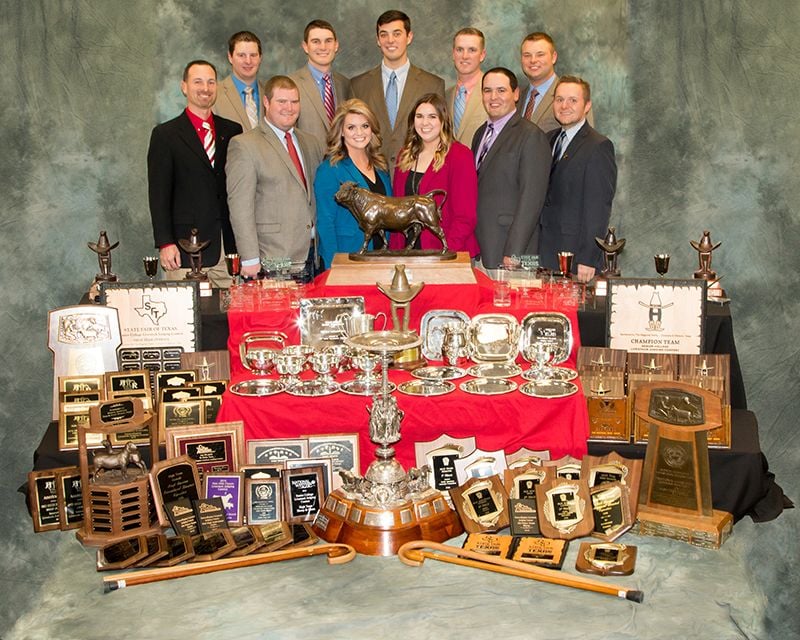
2016 Texas Tech University Livestock Judging Team
Jennings pictured second from left of top row
Photo courtesy of Texas Tech University Department of Animal & Food Sciences
Operations like the R.A. Brown Ranch rely on individuals, like Jennings, who have an eye for physical evaluation and understand the relationship between genotypic and phenotypic traits.
“I see evaluating livestock as one of our number one jobs because we’re examining them to one, make them the best animal they can, and two, to make sure that animal is healthy,” said Tucker Brown, cow herd manager at the R.A. Brown Ranch.
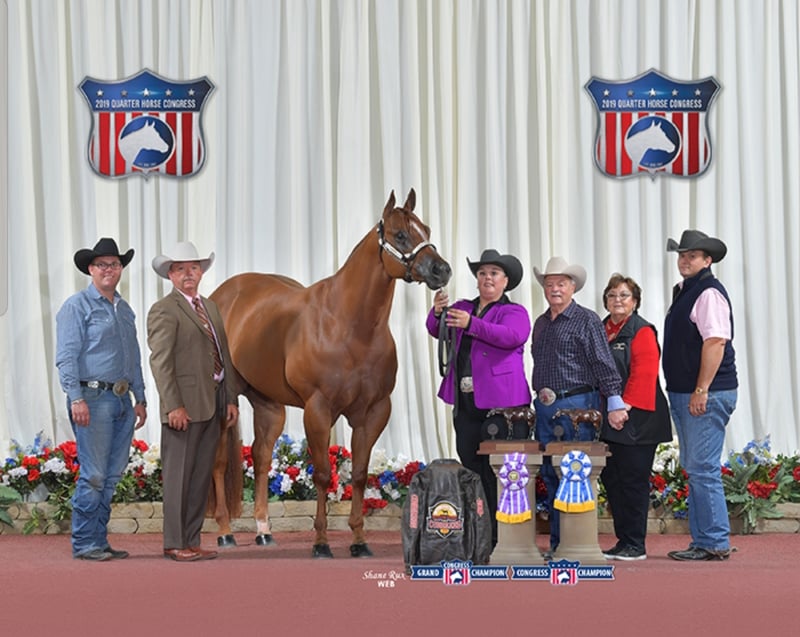
Covenant Show Horse Team, Wainscott pictured center
Photo courtesy of Kelley Wainscott
Covenant Show Horses
Covenant Show Horses, owned and operated by Adam and Kelley Wainscott, is known for its elite training services. The Covenant Show Horses team has trained some of the finest Quarter Horses and Paint Horses in the nation, including stock from Three Nails Ranch and Double C Acres. A distinguished trainer and judge, Kelley Wainscott credits her career success to her early involvement in horse judging programs. Throughout her twenty-year career, Wainscott has accumulated more than 200 world and reserve world championships.
“Not only did it pave the way for me to become passionate about the equine industry, but it also paid for a college career and gave me the background and skills that I needed at a very young age to develop my eye for training and choosing the right horses,” said Wainscott.
Tyson Foods
Few judging programs, or any competitive teams for that matter, can tout the Texas Tech meat judging program’s winning record. Collin Corbin was a member of the 2009 team and also coached the 2012 national championship team at Texas Tech. Now a senior food scientist at Tyson Foods, Corbin prefers to hire former meat judgers because he knows they have a solid background in meat science principles and can readily apply that knowledge in their position at Tyson Foods.
“90% of the people we have hired in research and development have a meat judging background,” said Corbin. “It gives them a foundation of knowledge that we like to see.”
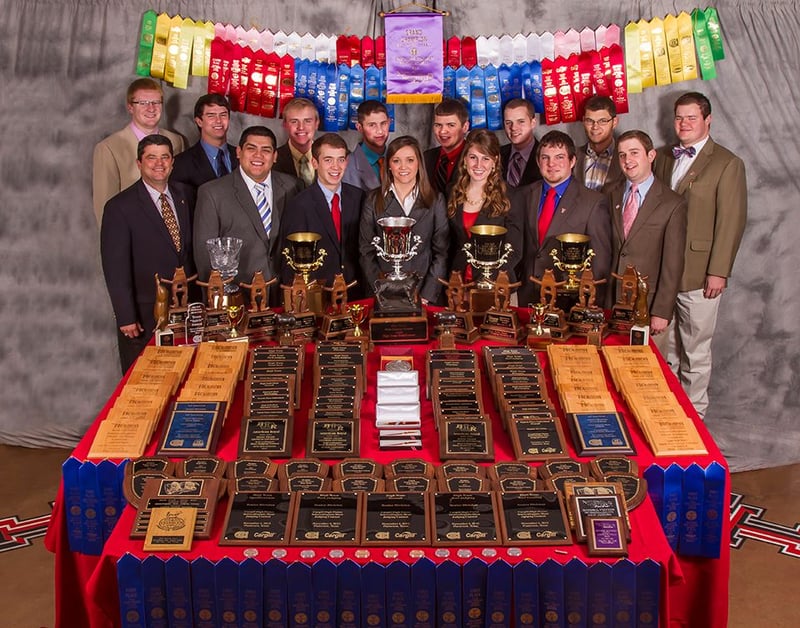
2012 Texas Tech University Meat Judging Team
Corbin pictured far right of bottom row
Photo courtesy of Texas Tech University Department of Animal & Food Sciences
Soft Skill Development
Not only does involvement in judging programs have an immediate impact on an individual’s technical knowledge and competencies, it also positively impacts a person’s soft skills. Also known as employability skills, soft skills relate to someone’s ability to function in the workplace. These skills include, but are not limited to, interpersonal communication, teamwork, critical thinking, decision making and work ethic.
Research has shown participation in judging programs has a positive impact on an individual’s soft skill development. A study from Oklahoma State University found 96 percent of former livestock, horse and meat judgers report the skills they gained during their time as a competitive judger positively impacted their career development and were relevant to their current positions. The study also determined former judgers are more confident in their verbal communication skills and leadership abilities due to their time spent judging.
As reported by the Journal of the National Association of County Agricultural Agents, judging team participation influenced the education and career decisions and positively impacted the soft skills of study participants. Researchers from West Virginia University found more than 90 percent of former judgers had confidence in their soft skills as a result of participation in a judging program. The Journal of Leadership Education reported competitive judgers saw the highest increase in the enhancement of their verbal and interpersonal communication skills.
The importance of soft skill development related to judging programs cannot be undervalued. According to the American Association of Community Colleges, 73 percent of employers struggle to find workers with the necessary soft skills. At least 65 percent of employers say soft skills are the most in-demand qualification. The Institute for Social, Behavioral and Economic Research at the University of California, Santa Barbara found employees who demonstrated proficiency in soft skills, combined with mastery of technical competencies, earned an average of 10 percent more than employees with poorly developed employability skills. According to the National Soft Skills Association, 85 percent of job success comes from having an aptitude for soft skills.
Southern New Hampshire University reported 78 percent of hiring managers look for applicants who can work well in a team dynamic, and 75 percent want employees to think critically. However, Forbes reported 60 percent of new employees lack confidence in critical thinking and problem-solving scenarios. Burning Glass determined one in three skills listed in a job posting are classified as general employability skills. Research from Harvard University found the percentage of job postings emphasizing soft skills are rising and increased by 10 percent from 1980 to 2010.
Verifying Knowledge & Skills
As evidenced by personal testimonials and statistical data, participation in youth or collegiate judging programs provides a myriad of benefits to judges and their future employers. Professional associations representing all facets of the competitive judging space have stepped forward as leaders in their respective industries to provide individuals with an opportunity to validate their selection and evaluation skills. While industry certifications are not a criteria for involvement on a judging team, preparing to sit for a certification exam allows individuals to sharpen their knowledge and skills, and earning an industry is a strategic move in a person’s educational or career development.
American Meat Science Association Meat Evaluation Certification
The American Meat Science Association (AMSA) is a broad-reaching organization of individuals that discovers, develops and disseminates its collective meat science knowledge to provide leadership, education and professional development. In addition to helping meat science professionals achieve previously unimaginable performance levels, AMSA functions as the governing body of meat judging in the United States. Driven by a desire to offer meat judgers and other interested professionals an opportunity to verify their understanding of fundamental meat science concepts, AMSA launched the AMSA Meat Evaluation Certification in 2015.
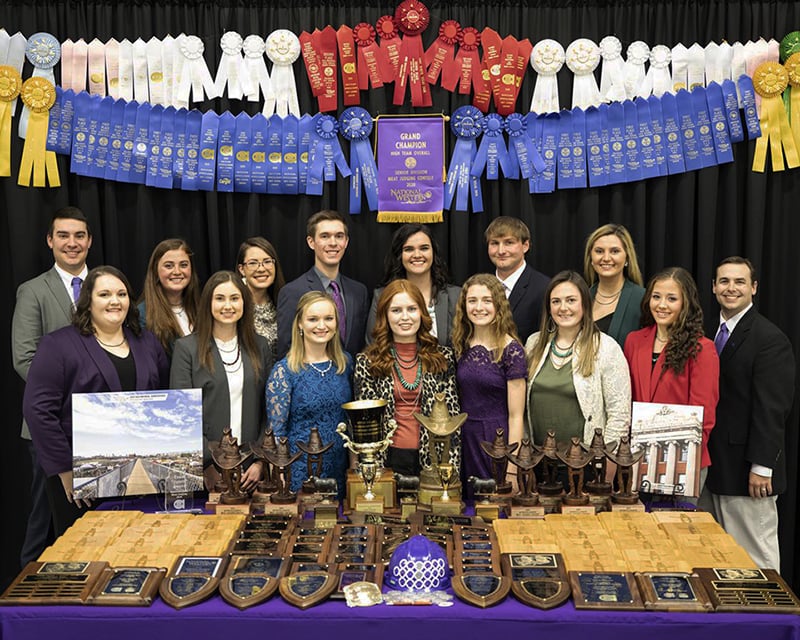
2020 Kansas State University Meat Judging Team
O'Quinn pictured far right
Photo courtesy of Megan O'Quinn
The AMSA Meat Evaluation Certification verifies individuals are better prepared to enter fields related to the meat industry, specifically the production and processing sectors. The certification exam assesses knowledge and skills in meat carcass quality grading, meat handling and food safety. Because of their extensive background in the field, AMSA Meat Evaluation Certification earners are more qualified and prepared to enter in-demand roles within the meat and food industries.
Travis O’Quinn, Ph.D., is an associate professor and meat judging coach at Kansas State University and an active and recognized AMSA member. An advocate for the AMSA Meat Evaluation Certification, and AMSA’s other industry certifications, O’Quinn believes an understanding of carcass evaluation is essential to success in the meat science industry.
“From a meat industry standpoint, evaluation skills are wide-ranging in terms of ability to assess both carcasses and cuts for value,” said O’Quinn. “[An individual should] be able to determine how we can actually balance differences in quality versus trimness of muscling to really help employers be able to segregate carcasses and cuts.”
National Collegiate Livestock Coaches’ Association Principles of Livestock Selection & Evaluation Certification
The National Collegiate Livestock Coaches’ Association (NCLCA) provides unique opportunities for students to develop an understanding of the livestock industry through educational settings beyond traditional classrooms. Led by coaches from various universities throughout the United States, NCLCA oversees livestock judging events across the nation. NCLCA created the NCLCA Principles of Livestock Selection & Evaluation Certification in 2015. NCLCA developed the certification to strengthen livestock judging programs and offer more career development opportunities to those passionate about the livestock industry.
The NCLCA Principles of Livestock Selection & Evaluation Certification verifies individuals have acquired the specialized skills necessary to excel in the livestock industry. The certification validates the foundational competencies needed to begin animal science careers, specifically those related to selecting and evaluating breeding and market animals. Those who earn the certification are more qualified and prepared to enter a variety of roles within the industry.
“I think the main thing most employers like to see is the learner is committed to educating themselves and improving themselves,” said Parker Henley, Ph.D., Oklahoma State University assistant professor and livestock judging coach.
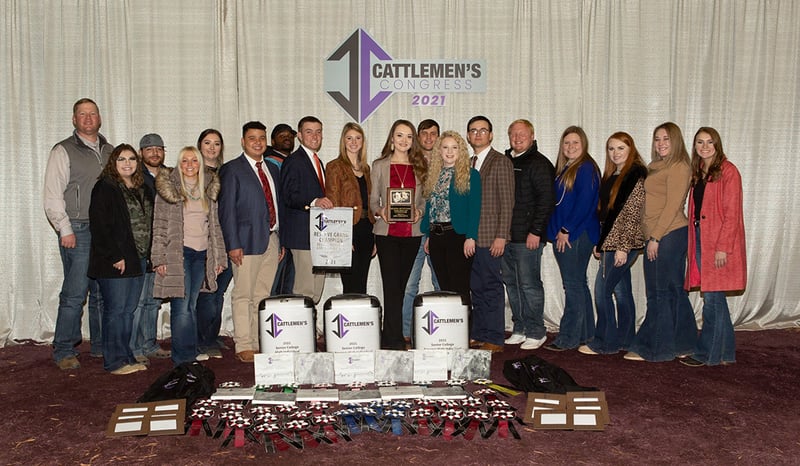
2020 Oklahoma State University Livestock Judging Team
Henley pictured far left
Photo courtesy of Parker Henley
In addition to his role at Oklahoma State, Henley also serves as the NCLCA president. A product of some of the most distinguished livestock judging programs in the nation, Henley sees the relevance of evaluation and selection skills to livestock operations, plus the development of soft skills, as the advantages of participation in livestock judging teams. “Time management, decision-making skills, networking, all these different things we outline as the real benefits of being a part of a judging program,” said Henley.
National Horse Judging Team Coaches’ Association Equine Management & Evaluation Certification
The National Horse Judging Team Coaches’ Association (NHJTCA) is dedicated to promoting, encouraging and aiding the training of coaches and evaluation teams to strengthen the skills of the students participating in horse judging contests nationally. By providing and enhancing communication and networking among coaches, NHJTCA encourages consistency among the equine evaluation industry, especially within the horse judging realm. NHJTCA launched the NHJTCA Equine Management & Evaluation Certification to meet employers’ and workers’ needs within the equine industry.
First offered in 2019, the NHJTCA Equine Management & Evaluation Certification proves earners have enough background knowledge to pursue work in the equine industry. The certification validates the knowledge and skills needed to begin careers related to equine evaluation, breeding, handling and stable management.
“The more opportunities individuals can get to practice those knowledge-based skills and develop those skills is going to really enhance their opportunities as they go, whether it’s into college or even enter directly into the respective industries,” said Dr. John Pipkin, Ph.D.
Perhaps the most renowned horse judging coach in the world, Pipkin is a regents professor and horse judging coach at West Texas A&M University, in addition to presiding as the NHJTCA president. A long-time advocate for personal and professional development, Pipkin was integral in creating the NHJTCA Equine Management & Evaluation Certification.
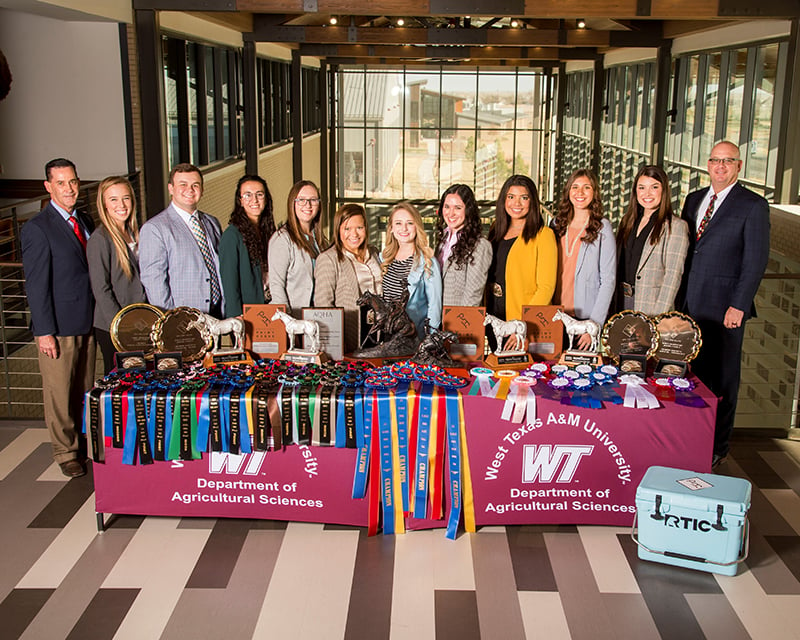
2020 West Texas A&M University Horse Judging Team
Pipkin pictured far left.
Photo courtesy of Kenda Pipkin
Regardless of what type or level of judging a person participates in, the knowledge and skills gained will be applicable long after turning in the Scantron at their final contest. Whether a person actively uses the selection and evaluation skills or instead relies on the soft skills honed during their time as a competitive judger, they will be more prepared for their future career, whatever industry or sector they choose.
About iCEV
Since 1984, iCEV has specialized in providing quality CTE curriculum and educational resources. iCEV is the most comprehensive online resource for CTE educators and students, offering curriculum for several major subject areas, including agricultural science, trade & industrial education, business & marketing, career exploration, family & consumer science, health science, law enforcement and STEM education. Additionally, iCEV acts as a testing platform for industry certifications. Leading companies and organizations utilize iCEV as the testing platform for their certifications. For more information, visit www.icevonline.com.
